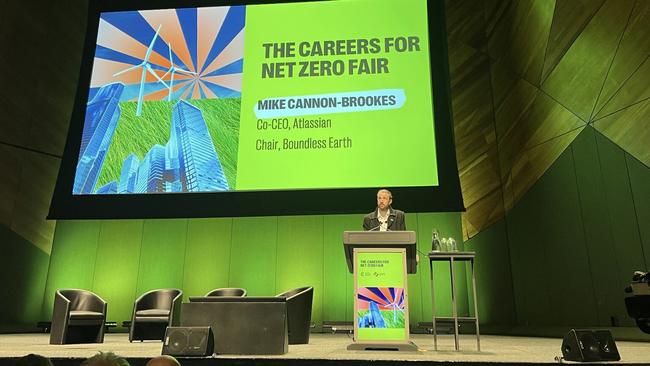‘We need to spend less time focused on shutting down coal’ to accelerate climate action: Mike Cannon-Brookes
Atlassian billionaire Mike Cannon-Brookes says economics will end the coal-fired era, not talking, as he urges more investment in renewable technologies.
Climate activists need to spend less time advocating for the closure of coal-fired power stations and telling Australians to stop driving petrol cars to ensure the country remains globally competitive in the green-energy transition.
That is according to Atlassian billionaire co-founder and co-chief executive Mike Cannon Brookes – a message that may seem contrary to his previous comments on tackling climate change.
But Mr Cannon-Brookes hasn’t had a change of heart.
Instead, he is aiming to accelerate the clean energy shift by encouraging more ‘doing’ and less debating. He has even backed job classified site Terra.do – making an undisclosed investment via his climate fund Boundless Earth – as part of a push to shift 100,000 Australian workers into clean energy careers by 2027.
“The best way to shut down what doesn’t serve the planet, and our economy, I believe, is to create the new things that need to exist,” Mr Cannon-Brookes said at the Careers for Net Zero Fair in Melbourne on Thursday.
“This means less time focused on shutting down coal stations, and more time on creating solar farms and batteries. It means less time telling Aussies to stop driving petrol cars – and more time creating standards that encourage and incentivise more EVs on our roads.
“At this point in history – we no longer need to talk as much about stopping things because the economy has done that for us. Fossil fuels are unreliable and expensive compared to renewables when it comes to energy generation. We’ll see this filter through industry after industry. We will electrify everything.”
Australia has set a target of having renewable energy generate 82 per cent of the country’s electricity by 2030, a key pillar of the legislated target of reducing emissions by 43 per cent by the end of the decade.
While Mr Cannon-Brookes is advocating a more rapid uptake of renewable projects, APG Group chairman and former AGL Energy boss Michael Fraser has warned that the only way to mitigate the economic and policy turmoil caused is to support the development of new gas fields.
“There are several longstanding and emerging gas projects that need to be progressed quickly. The time frames needed to bring this new investment to the market are long. You can’t just wake up one day and click your fingers to solve the problem,” Mr Fraser said.
But Mr Cannon-Brookes believes individual Australians can make a difference, hence his investment in Terra.do, which he described as the Seek of clean energy jobs. He said 100,000 clean energy roles need to be filled in the next four years to ensure Australia could take advantage of the “tsunami of clean energy roles that is coming”.

“The more people we get into climate jobs, the bigger the snowball effect. Because we will start more things, and that will create more jobs that can start even more things. Ultimately, this snowball effect will grow to what Australia’s Jobs and Skills report estimates could be 2 million clean economy jobs in Australia by 2050,” Mr Cannon-Brookes said.
“The International Energy Agency says that in a 1.5 degree aligned scenario, close to 13 million jobs in fossil fuel-related industries will be lost. That is entirely true. But it’s also true that in this same scenario, 30 million new clean energy jobs will be added by 2030.
“To rephrase that simply, more than two clean energy jobs will be created for every fossil fuel-related job lost. That’s a two for one deal. And the faster Australia executes this shift, the more chance we have of re-skilling those fossil fuel jobs to actively contribute to the tsunami of clean energy jobs that is coming. And the higher the chance that those new jobs are in Australia – which is where, I’m sure, is where we’d all like them to be.”
He was speaking as Anthony Albanese announced a $2bn expansion of government investment into Australia’s critical minerals resources sector on a visit to Washington – a move that aims to leverage the clean energy supply chain partnerships under the US’s Inflation Reduction Act (IRA).
Mr Cannon-Brookes praised the investment but said Australia has to do more to be globally competitive.
“I think the challenge there is obviously things like the IRA and the competitive position that puts us into against all other nations.
“The IRA is a great piece of legislation. It’s quite smart, very thoughtful. But for other countries, we need to decide how we’re going to compete with that. We’ve seen Canada make a series of moves in the same direction, (as well as) in Japan and the EU. We have to choose how and where we’re going to compete. And it probably takes a bit more than $2bn.
“But it’s a good start.”
Mr Cannon-Brookes said Australians should also not feel daunted about seeking out clean energy jobs.
“Do what you do now, but do it in climate. You don’t need to be an expert and in fact some of the most incredible talent in this space aren’t ‘traditional climate experts’ – they’re technologists, strategists, writers, lawyers, designers and analysts, people from every discipline you can think of.
“Too often I see super passionate people holding themselves back because they think they don’t have the skills they need to meaningfully contribute.
“Australia is at near full employment, so where you choose to work determines where the economy goes.”






To join the conversation, please log in. Don't have an account? Register
Join the conversation, you are commenting as Logout